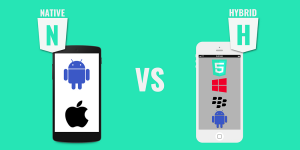
Some years back, a bunch of engineers were keen on finding out a hybrid mobile app development framework for both iOS and Android that is when they introduced React Native. React Native enables the combination of native application development and JavaScript development. React Native is well defined as a JavaScript code library which allows the reusing of codes across the web and on mobile and has been introduced by Facebook and Instagram. With different code bases, business firms often find it difficult to find developer differently for iOS and Android. But with the introduction of React Native, one developer has got access to write for both mobile operating systems at once.
Let’s now look into the pros and cons of React Native to understand the concept in a better way:
♦ Pros of React Native
1. Easy to build
React Native does not demand much time to undergo the process of development. It can be developed easily with very less time. Certain components of React Native lead to the acceleration of the processes.
2. It is featured with Stability
React Native has been developed in a way that usually avoids all the bugs and shortcomings delivering an accurate performance. It can be relied on by all OS devices.
3. One framework offering multiple platforms
With the possibility of copying the codebase, react native can lead to the full cross platform development. But this relies on your use of native modules in your application. Cross platform development also turns out to be economically viable to increase the popularity for the mobile apps.
4. Faster and Better Performance
React Native applications turns out to be faster in their performance. Many of us don’t feel so, but it has been proven that React Native based delivers with a fast service. The problem persisting can be resolved by just transferring some of the codes in the native module.
5. Less Human Resources leading to more productivity
Separate teams for Android and iOS have never been the demand of React Native. With Cross Platform offerings, even a small team can work on the development process accurately. With the required knowledge, an individual programmer can develop an app for both iOS and Android.
♦ Cons of React Native
1. Lack of smooth Navigation
React Native lacks in the delivering with a smooth navigation. The performance of React Native is lesser than the Native ones. It is expected to get better but it never can be the same when compared to Native Navigation.
2. Need of hiring experience Native developers in the beginning
Even after setting up a team of qualified and experienced engineers, there arises the need for calling an experienced Native developer. The developers are needed even for the implementation of certain activities and modules. This does not favour React Native and even affects the final costing of project.
3. Boundations by Facebook
You need to operate on Facebook’s license which makes you dependant on them. Facebook in order to ensure React Native’s reliability and delivering consistency in the platform development puts in a lot of resources. While facing patent related issues, facebook holds the right to revoke the license allowing the use of React Native.
4. Difficulties in Renewing the license
Installation of React Native demands you to accept all the rules pertaining to facebook license. Due to this one may face a lot of difficulties in getting the license renewed when you try obtaining the patents for derived software.
Conclusion
React Native offers a powerful solution for building cross-platform apps, but it’s not a one-size-fits-all solution. Weigh the pros and cons of React Native carefully and determine if it aligns with your project’s needs. For the right project, React Native can streamline development and deliver a high-quality user experience






